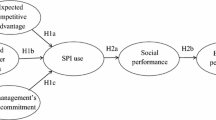Abstract
Carroll (1991) encouraged researchers in Social Issues Management (SIM) to continue to measure Corporate Social Performance (CSP) from a variety of different perspectives utilizing a variety of different measures. In addition, Wolfe and Aupperle (1991) (and others) have asserted that there is no, single best way to measure CSP and that multiple measures and perspectives help develop the field. However, Pfeffer (1993) suggest that a lack of consistent measurement has constrained organization studies (and by implication, the field of social issues management,) in its development as a field. It may be in the best interest of social issues management researchers to try to development a common body of measures and data. Recently, Kinder, Lydenberg and Domini & Co. (KLD — a social choice investment advisory firm) has made available their social performance database. The KLD data have potential to become a widely accepted set of CSP measures. The purpose of this paper is to present a construct validity study comparing the KLD data to other measures of CSP.
Similar content being viewed by others
Bibliography
Aupperle, K. E.: 1984, ‘An Empirical Measure of Corporate Social Performance’, in L. E. Post (ed.), Research in Corporate Social Performance and Policy 6, 627: 654.
Aupperle, K. E.: 1991, ‘The Use of Forced Choice Survey Procedures in Assessing Corporate Social Orientation’, in L. E. Post (ed.), Research in Corporate Social Performance and Policy V12, 269: 279.
Bowman, E. H. and M. Haire: 1975, ‘A Strategic Posture toward Corporate Social Responsibility’, California Management Review 18(2), 49–58.
Carroll, A. B.: 1979, ‘A Three Dimensional Model of Corporate Social Performance’, Academy of Management Review 4, 497–505.
Carroll, A. B.: 1991, ‘Corporate Social Performance Measurement: A Comment on Methods for Evaluating an Elusive Construct’, in L. E. Post (ed.), Research in Corporate Social Performance and Policy V12, 385–401.
Chen, K. H. and R. W. Metcalf: 1980, ‘The Relationship between Pollution Control Record and Financial Indicators Revisited’, Accounting Review 55, 168–177.
Folger, H. and F. Nutt: 1975, ‘A Note on Social Responsibility and Stock Valuation’, Academy of Management Journal 18, 155–159.
Galaskiewicz, J. and R. S. Burt: 1991, ‘Interorganizational Contagion in Corporate Philanthropy’, Administrative Science Quarterly 36(1), 88–99.
Graves, S. B. and S. A. Waddock: 1993, ‘Institutional Owners and Corporate Social Performance: Maybe Not So Myopic After All’, Proceedings of the Annual Meeting of the International Association for Business and Society — San Diego.
Kerlinger, F. N.: 1986, Foundations of Behavioral Research (Holt, Rinehard & Winston, New York).
Lerner, L. D. and G. E. Fryxell: 1988, ‘An Empirical Study of the Predictors of Corporate Social Performance’, Journal of Business Ethics 7(12), 951–959.
Lydenberg, S., A. T. Marlin and S. Strubb: 1985, Rating America's Corporate Conscience (Addison Wesley, Reading, MA).
McGuire, J. B., A. Sundgren and T. Schneeweis: 1988, ‘Corporate Social Responsibility and Firm Performance’, Academy of Management Journal 31(4), 854–872.
O'Neil, H. M., C. B. Saunders and A. D. McCarthy: 1988, ‘Board Members, Corporate Social Responsiveness and Profitability: Are Tradeoffs Necessary?’, Journal of Business Ethics 8(5), 353–357.
Pfeffer, J.: 1993, ‘Barriers to the Advancement of Organizational Science: Paradigm Development as a Dependent Variable’, Academy of Management Review 18(4), 599–611.
Pinkston, T. S. and A. B. Carroll (Forthcoming), ‘Corporate Citizenship Perspectives and Foreign Direct Investment in the U.S.’, Journal of Business Ethics.
Ruf, B., K. Muralidhar and K. Paul: 1993, ‘Eight Dimensions of Corporate Social Performance: Determination of Relative Importance Using the Analytic Hierarchy Process’, Best Papers Proceedings, Academy of Management Annual Meeting Atlanta.
Schwab, D. P.: 1980, ‘Construct Validity in Organizational Behavior’, in B. M. Staw and L. L. Cummings (eds.), Research in Organizational Behavior 2, 3–43.
Spencer, B. A. and G. S. Taylor: 1987, ‘A Within and Between Analysis of the Relationship Between Corporate Social Responsibility and Financial Performance’, Akron Business and Economic Review 18(3), 7–18.
Spicer, B. H.: 1978, ‘Investors, Corporate Social Performance and Information Disclosure: An Empirical Study’, Accounting Review 53, 94–111.
Wang, J. and B. S. Coffey: 1992, ‘Board Composition and Corporate Philanthropy’, Journal of Business Ethics 11(10), 771–783.
Wartick, S. L.: 1992, ‘The Relationship between Intense Media Exposure and Change in Corporate Reputation’, Business and Society 31(1), 33–42.
Weber, R. P.: 1985, Basic Content Analysis (Sage Publications, Beverly Hills, CA).
Wokutch, R. E. and E. W. McKinney: 1991, ‘Behavioral and Perceptual Measures of Corporate Social Performance’, in L. E. Post (ed.), Research in Corporate Social Performance and Policy V12, 309–330.
Wokutch, R. E. and B. A. Spencer: 1987, ‘Corporate Saints and Sinners: The Effects of Philanthropic and Illegal Activity on Organizational Performance’, California Management Review 29, 62–77.
Wolfe, R.: 1991, ‘The Uses of Content Analysis to Assess Corporate Social Responsibility’, in L. E. Post (ed.), Research in Corporate Social Performance and Policy V12, 281–307.
Wolfe, R. and K. Aupperle: 1991, ‘Introduction to Corporate Social Performance: Methods for Evaluating an Elusive Construct’, in L. E. Post (ed.), Research in Corporate Social Performance and Policy V12, 265–268.
Author information
Authors and Affiliations
Additional information
Mark P. Sharfman is Assistant Professor of Strategic Management at the University of Oklahoma. His research interests are in corporate social performance, the firm/business environment relationship and measurement issues. He has published his research in the Academy of Management Review, Decision Sciences, Journal of Management and the Strategic Management Journal. He is a member the Academy of Management, International Association for Business and Society and Strategic Management Society.
Rights and permissions
About this article
Cite this article
Sharfman, M. The construct validity of the Kinder, Lydenberg & Domini social performance ratings data. J Bus Ethics 15, 287–296 (1996). https://doi.org/10.1007/BF00382954
Issue Date:
DOI: https://doi.org/10.1007/BF00382954




